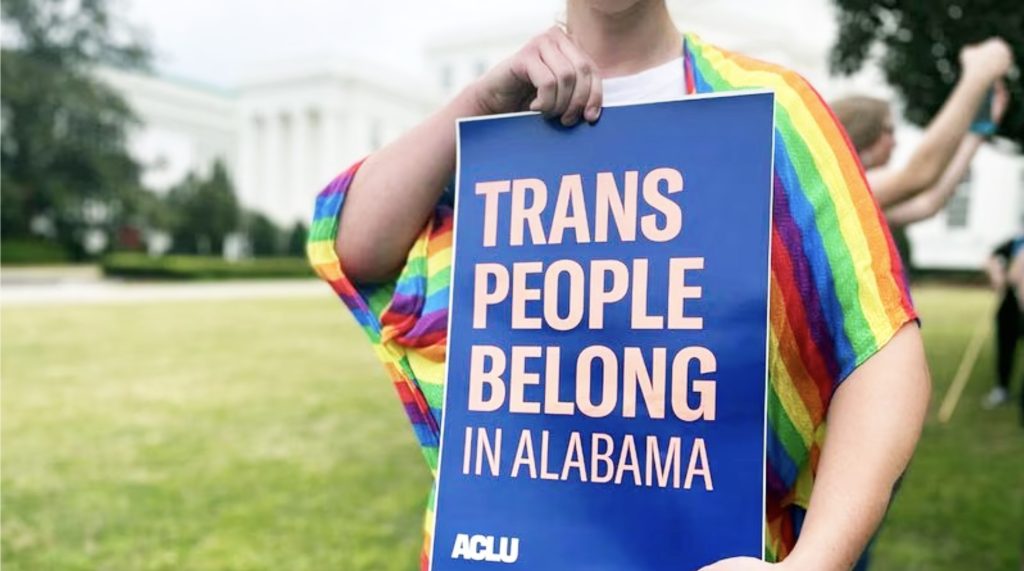By Jemma Stephenson and Alabama Reflector
When she heard a federal court had allowed Alabama to criminalize medicine for transgender youth, Cardelia Howell-Diamond wanted to cry.
Out of anger.
“We felt pretty betrayed by the U.S. court system,” she said.
On Monday, a three-judge panel of the U.S. 11th Circuit Court of Appeals lifted an injunction on a 2022 Alabama law making it a felony for physicians to prescribe puberty blockers and hormones to transgender individuals under the age of 19.
U.S. Circuit Judge Judge Barbara Lagoa wrote in her opinion that past due process cases do not establish a fundamental right to gender affirming care. Lagoa also cited the U.S. Supreme Court’s decision in Dobbs v. Jackson Women’s Medical Center, which struck down federal protections for abortion rights. In his majority opinion in Dobbs, Justice Samuel Alito argued that the 14th amendment does not protect rights without a long history and tradition.
Most transgender youth and their families Tuesday shared Howell-Diamond’s anger. Many were frightened, and some wondered how long they could stay in the state.
“I don’t want to feel like I have to leave Alabama because of this rise in hate and bigotry, and so I just want to go back to an Alabama where we’re all happy and trying to make everybody live better and happier and not attacking certain groups and individuals,” said Harleigh Walker, a high school junior who lives in Auburn who is transgender.
The 2022 law makes it a Class C felony, punishable by up to 10 years in prison, for a physician to prescribe puberty blockers and hormones to transgender youth. In testimony to legislators and in a federal court hearing in Montgomery in May 2022, transgender youth, their families and physicians stressed that the medications were safe and critical to their well-being. One counselor told the federal court that losing the treatments would be like cutting off treatment to a cancer patient.
Alabama families are now eligible to apply for resources, including emergency grants, from the Campaign for Southern Equality. They are working in collaboration with the Magic City Acceptance Center and Prism United in Alabama.
‘Where everything turns out’
Howell-Diamond, who shared Tuesday that she lives in northern Alabama has two transgender children. When the decision came down, she spoke with Kai, her older child, a student at the University of Alabama Birmingham.
She said that Kai is using these decisions to weigh whether or not he wants to stay in Alabama long term. He wants to help other transgender children receive gender-affirming care, but but he needs to look out for his own mental health, as well.
“Right now, he’s just trying to make it through school and see where everything turns out when he graduates,” she said.
Howell-Diamond said that she sees a lot of “scaremongering” and promotion of an ideal that her kids will never be able to live up to.
“Heck, most of the American public is never going to live up to that 1950s dream of 2.5 kids and a dog and a house that you could own,” she said.
Walker said she’s not sure she will be able to access healthcare as the lawsuit plays out, which frightens her.
“I think that if there’s any opposition into any law whatsoever, I don’t think that that law should be passed until it’s for certain that legally it is okay,” she said.
The lawsuit, she said, is “kind of our last chance to rule against this hateful legislation,” she said.
The mother of a transgender boy who grew up in Alabama but just started his first year at an out-of-state university, wrote in a text message that the ruling left her “furious.” The mother, who requested anonymity for the sake of her son, said that she wonders if the government knows that there are standards supported by medical professionals.
“Anyone who breathes a word about caring for ‘liberty’ or ‘parental rights’ in any branch of government that also finds it legitimate to strip away the rights of parents to acquire medically-advised care for their youth is nothing less than a hypocrite,” she wrote.
Jeff Walker, Harleigh Walker’s father, said that Republican lawmakers passed laws so that their kids did not have to wear masks during the pandemic, emphasizing that it was a parent’s decision, but they will pass laws that impact others.
“It’s unto thee, not unto me,” he said.
Heather lives in rural Alabama with her son Rob, who is transgender. She asked that they be identified only by their first names. She said that she wishes her son’s existence, happiness and medical care was up to her as a parent– not lawmakers.
”Because I’m the one that knows my kid,” she said.
Heather moved back to where she lives now around two years ago. She lives where she grew up. Last year, she had been planning to move out of state again so that Rob could access medical care. Last fall, Rob had experienced some medical concerns that led her to keeping her family in the state longer.
“I’m moving my house,” she said. “I’m moving my kids. It’s impacting our families. It’s impacting my immediate family. It’s impacting. It will impact my kids and their relationships. With people that they have, you know, they know here now. “
The last two years have been the only ones that Heather’s kids have grown up around Heather’s family.
Heather said that her dream Alabama would be one that cares for LGBT kids and people with disabilities. She wants to be able to make medical decisions for her child.
“Not being able to make that decision for my child here would surely lead us down a road that I don’t even want to think about,” she said.
She said that she wishes that Alabama lawmakers knew transgender people. Heather said that Rob became more confident when he transitioned.
On the court decision, Heather said that it’s a “poor argument” that medical care should not be allowed because there isn’t a tradition and history with it.
“At one time, cigarettes were used as an asthma cure,” she said.
Looking forward, she said that she’s hopeful for an appeal, but she is not counting on the Supreme Court.
“I think what they’re going to do is they’re going to give it back to the states and let the states decide, and I know how that will go for kids who are just trying to survive and feel comfortable in their bodies,” she said.
Howell-Diamond said that many of these kids have been told by their classmates and churches that they are not wanted, and the government is now joining in. She said that the landscape is traumatic for children, especially for teenagers.
“Their entire desire is to be loved and accepted to become whoever it is that they’re destined to be, and when the world seems to be telling them they’re destined for being illegal, for not being allowed to exist, it causes a lot more mental and emotional anguish,” she said.
Right now, she said that the state is saying that they don’t want transgender kids.
“And if you won’t leave willingly, we’re going to make you leave,” she said.
Walker said that she felt like the decision was politically-motivated.
“We’ve seen countless and countless times there have been injunctions being grants against these anti-trans laws across the country and just to have that appealed, but also having more injunctions granted, it’s just showing that our justice system is corrupt,” she said. “And it’s not just by the rule of law. It’s by the rule of politics.”
Jeff Walker said the southeastern states have changed in a way with new legislation that means they may have to move halfway across the country.
“No one should feel like they’ve got to move halfway across this country to be safe and protected and it’s just, it’s ridiculous,” he said.
In the Alabama that Howell-Diamond wants, the state addresses things that are actually problems and kids are able to explore their gender identity and whatever career they want.
“I would love an Alabama where everyone really was, where everyone’s kid was really seen as everyone’s kid, where we put all of our youth as a priority and made the world a safer place for them through education, through loving, through caring and really just took to heart that there’s no such thing as other people’s kids,” she said.











